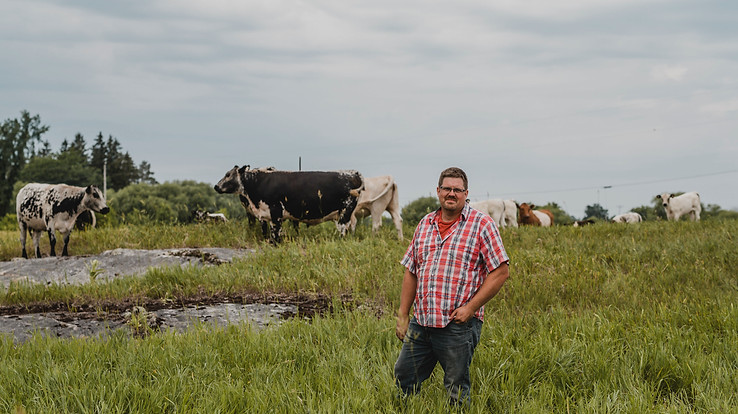Our Animals
Our Animals
At Netherleigh Farm we raise beef cattle, pigs, laying hens, meat chickens, and turkeys. Our animals spend most of their lives outside on our pastures enjoying lots of space, fresh air, exercise, and tasty green grass. We practice pasture-based farming techniques such as rotational grazing and multi-species grazing to ensure our animals get the highest quality feed from our land and to benefit from the natural relationships that animals form in the wild. We know that happy and healthy animals make for tender and tasty meat. We pride ourselves on the quality and flavour of our meat, and our customers agree that you can taste the difference!

Beef
Our beef cattle are a mix of heritage breeds including Belted Galloway and Speckled Park, a breed recently developed in Canada. These breeds were specially chosen for their ability to be raised and finished on nothing but their mother’s milk and grass.
Pork
We raise Lacombe pigs on our farm. Lacombe pigs are the first domestic breed to come from Canada. We chose this breed because of their hardiness and ability to forage and thrive outside all year long.

Poultry
In Quebec we have to follow strict rules regarding the number of chickens, turkeys and laying hens that we allowed to raise on our farm. We are working with our local ag office and the Quebec government to encourage the development of new rules that allow for farms such as ours who raise our poultry outside on pasture to be able to increase the number of poultry they are allowed to raise.
That said we do offer a limited number of fresh pastured chicken, turkeys, and eggs to our customers. Our chicken and turkeys spend most of their lives outside in our specially built chicken and turkey tractors that protect our birds from predators, and are moved daily to give the birds fresh pasture.
There are three easy ways to get our meat:
Sign up for regular twice-monthly deliveries of our meat. A great way to get healthy, delicious meat on your table without a large freezer!

A one-time delivery of meat. Great if you want to try before signing up for our subscription service!
Stock up your freezer with a large quantity of pork or beef at once.


What we feed our animals
Since cattle are ruminants they can get all their nutrients from a grass-based diet (with the exception of salt and some minerals). Our cattle are 100% grass-fed and finished on our (non-certified) organic pasture. Our pigs and poultry are able to meet 30-50% of their dietary needs from the bugs, roots, grass and dirt they eat on pasture, and the rest of their food comes from locally grown grains.
Seasonality
Some might be wondering how we can offer pasture meat year-round. After all we do live in Canada - it gets cold and our pastures are not always green. We take advantage of the green pastures of the growing season and raise and finish most of our beef and pork and all of our meat chickens and turkeys when the pastures are green. During the winter the animals on the farm are given a warm space in the barn with lots of access to the outside and plenty of high quality hay harvested the summer before.
What is rotational grazing?
Rotational grazing is meant to mimic the grazing patterns of the large herds of Bison that roamed the grass lands in North America for hundreds of years. These Bison would travel in huge herds intensely grazing areas for a very short period of time before moving on. This provided large amounts of manure which fertilized that grass lands and also allowed for a long recovery period for the grass to grow back again. In conventional grazing cattle are sent out to a large pasture for the summer. This often results in uneven manure distribution, beneficial pasture plants dying because they are given no chance to recover, and a general decrease in pasture quality and soil health. This can also lead to deficiencies in the feed available to the cattle which is typically replaced with cheap grain and corn. With rotational grazing we divide our pastures into small areas with electric fence and move our cattle daily. This results in an even distribution of manure over small areas and gives our small pasture paddocks weeks to recover before they are grazed again. This also provides much higher quality pasture and allows us to feed and finish all of our beef cattle without using any corn or grain products at all.
What is multi species grazing?
Multi species grazing is the practice of having different species of animals sharing the same pasture in succession and often has many beneficial results. On our farm we like to have our laying hens, meat chickens or turkeys in a pasture area a day or two after our cattle have left. Our poultry actually pick apart the cattle manure, eating the fly larva found inside. This not only helps break down the manure faster but means we do not have to worry about needing insecticides to protect our animals from cluster flies that often carry disease. We use our pig’s natural desire to root to help dig up and renovate old pastures that need a face lift.
